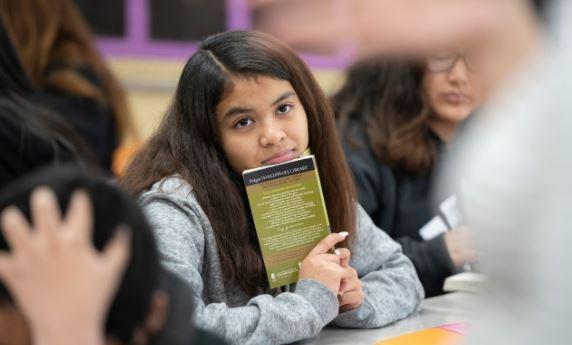Over the past months members of the Alliance staff have been working to update the English Language Arts (ELA) curricula to reflect greater diversity.
Over the past spring and summer, members of the Alliance ELA School Support team–-including Megan McGrail, David Schnall, Anne Krieg, Parinaz Banks, and Melissa Green––began a critical assessment of middle and high school ELA curricula by reviewing the diversity of authors, narratives, perspectives, and protagonists available to scholars. This is part of Alliance’s DEI & anti-racism roadmap under Priority #3: Dismantle Racist Institutional Behaviors, Practices, Systems, and Structures.
Ms. McGrail, Director of Humanities, explains that diverse representation in literature matters because scholars should see cultures represented in “a comprehensive and complete way, and not as a single story that represents a whole culture.” For example, there is more to experience about Black and African American culture than slavery or the civil rights movement. She finds that providing scholars with a rich experience “builds a love of reading and a love of learning.”
In reviewing the middle school curricula, the team found that the selection of books had limited diversity overall and that in many texts the protagonist was not a BIPOC (Black, Indigenous, or Person of Color). At the start of the 2020-21 school year, the team recommended middle schools move to CommonLit, an online resource offering a wider range of literature from a more diverse set of authors.
For high school, the team coded all texts currently available to scholars by author, race, themes, perspectives, and protagonists and discovered that there was a major absence in Latinx and Black or African American authors. With this newly defined baseline, the team will now decide which texts to replace, eliminate, and add to the curriculum map through the end of the school year.
Ms. McGrail recognizes that the majority of her ELA School Support team does not identify as BIPOC and therefore has blindspots in completing this important initiative. To mitigate this, the team has decided to offer opportunities called “Learning Modules” to partner with high school ELA teachers on reviewing upcoming units in the current curriculum and determining “how to make the balance of authors even more rich.”
In addition to the curricula updates for this school year, the Humanities team is building a diverse ELA Working Group–along with significant and widespread stakeholder input–to improve both the middle and high school curricula for the 2021-22 school year because “changing text is good, but not enough,” explains Ms. McGrail. A parallel initiative is also happening to create a social justice framework for middle and high school history courses.







